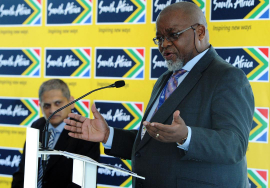
Mineral Resources and Energy (DMRE) Minister, Gwede Mantashe, says South Africa will pursue a transition from a high to low carbon emissions path that does not leave the vulnerable and most affected behind.
Mantashe was speaking at the annual Black Business Council Summit on Friday.
Government has consistently called for an energy transition that is just and considers South Africa’s immediate energy needs.
Mantashe echoed these sentiments: “As a sovereign State, our approach cannot be about 'one against the other', but one that is premised on the balance between fulfilling our country’s socio-economic needs, while preserving the environment. Hence, we advocate for a just transition from high to low carbon emissions, instead of a transition from coal to renewables,” he said.
Transitioning South Africa’s coal-powered stations – which release high carbon emissions – is expected to come at the cost of hundreds of thousands of jobs in the coal mining sector and the communities where these power stations are based.
Mantashe said this by-effect of the transition cannot be set aside.
“The justness in the transition must be seen to be done. It must be people-centred and take into consideration the socio-economic conditions of communities that are directly affected by the transition, such as the communities in the Mpumalanga coal-belt.
“We must, therefore, never allow ourselves to be encircled by the developed nations who fund lobbyists to pit our country’s developmental needs against their own self-serving protection of the environment. Our country deserves an opportunity to transition at pace and scale determined by its citizens,” he said.
Mantashe emphasised that although South Africa remains resolute on transitioning at a manageable pace, government has ramped up the pace in procuring energy from renewable energy sources in line with the Integrated Resource Plan (IRP 2019).
Currently, South Africa’s power system has some 6GW of energy generation capacity from renewable sources with more to come.
“The DMRE has, through the Independent Power Producer (IPP) office, procured a total of 7 786 MW via the Risk Mitigation Programme and Bid Windows 4, 5 and 6. A total of 2 130 MW are connected to the grid. A total of 150 MW, under RMIPPPP, and 784 MW, under Bid Window 5, are envisaged to be operationalised between November 2023 and August 2024, respectively.
“Projects totalling 1 000 MW, under Bid Window 6, have been allocated. 3200 MW wind capacity could not be allocated due to grid unavailability,” Mantashe said.
A further 10 000 MW will be procured through the upcoming Bid windows 7 and 8.
Mantashe highlighted that whereas nations with developed economies face a smoother transition, less developed countries are still battling with rudimentary elements like universal access to electricity.
“The crux of the matter is that whereas developed nations have turned their focus to reconfiguring their energy systems to be supported by clean energy systems for the transition, the African continent is still grappling with achieving universal access to energy.
“There is no doubt that we are faced with tough and complex policy choices to address energy poverty, while heeding the clarion call to combat adverse climate change which impacts on the health and wellbeing of the people,” Mantashe said. – SAnews.gov.za


